What is an attic and how to equip it?
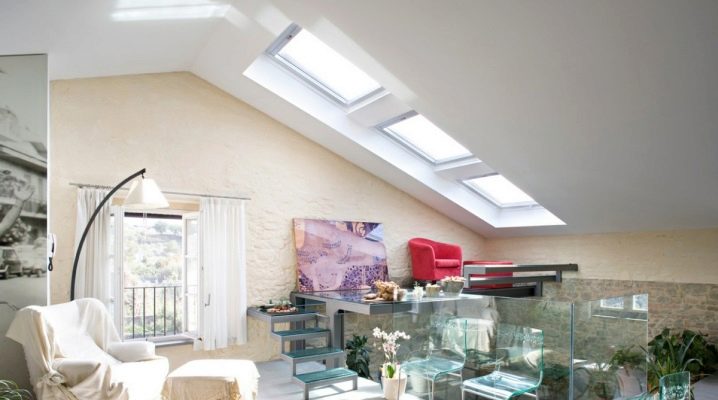
In regions with a cold climate, houses with a high pitched roof were previously erected. The air space under the roof kept warm in winter and protected from the heat in summer. With the advent of heating devices and modern insulation materials, this space has ceased to be a repository of old things, it has become a way of expanding living space. The attic began to be converted into an attic. To understand what a modern attic is, how to equip it with maximum benefit, we will consider the features of this room and different design options.
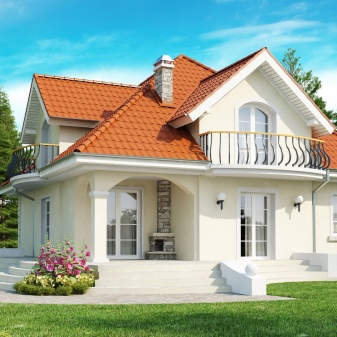
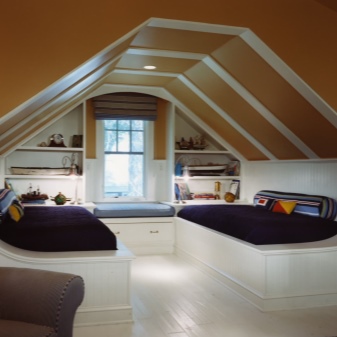
What it is?
The term "attic" came to us from France. This is the name of a dwelling equipped with a roof, which has a roof instead of a ceiling and walls. Originally, the poorest people lived in the attic rooms. With the development of industry, the influx of population into the cities of Western Europe and dense buildings, attic rooms have turned into full-fledged housing. Today, this method of expanding the usable area of a private house or cottage has gained popularity in Russia.
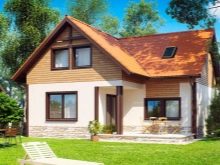
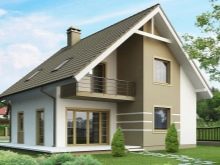
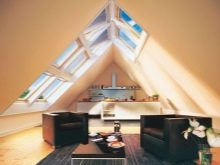
More and more developers offer functional use of empty attic spaces in order to accommodate additional rooms for various purposes in them. This can be a small area under the highest point of the roof and a large area equal to the area of the foundation. According to building codes, a residential attic should have natural light from roof windows. Windows can be vertical or tilted. The attic floor is usually connected to the lower floor by an internal staircase or lift.
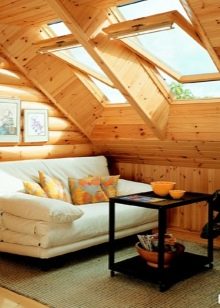
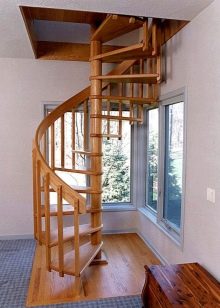
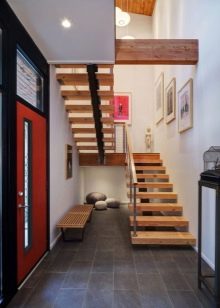
In warm regions, the stairs may be located on the outside of the façade. Attics are unheated (for seasonal living in a country house) and heated (for all-season living in a private house). The area of the heated attic space is included in the total living area of the house (as opposed to the attic). The configuration of the walls and ceiling can be any, but it should not violate the structural integrity of the building.
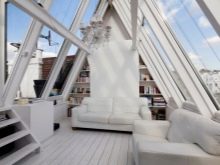
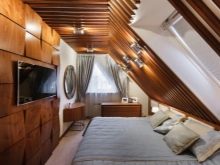
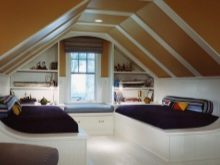
What to choose: an attic or a full-fledged second floor?
The developer is faced with a natural question: which is better - to equip the attic or build another full-fledged floor. The legislation of the Russian Federation, when determining the number of storeys of a house, considers a heated attic to be a floor. If it comes to an already existing building, when rebuilding an attic into a heated attic, it will be necessary to re-register all existing documents for the reconstruction of the house. Otherwise, the attic floor may be considered an unauthorized extension.
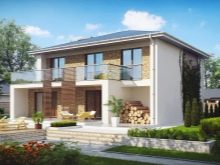

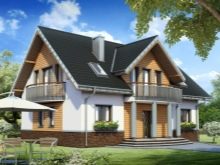
The fact of the need to register an additional floor leads to doubts: prefer insulation and decoration of the attic or build a second floor. The whole floor is more capital construction than the attic. Modern building materials make it possible to technologically and quickly convert the attic floor into an attic. The construction of capital walls will require the entire cycle of construction work and strengthening of the foundation, which will entail large financial costs.
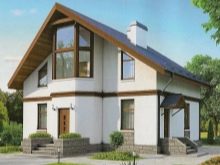

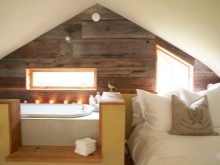
Another reason is the need for additional living space. Under the slopes of a complex roof, the living area, which is comfortable in height and configuration, can be small, and the owners of the house need to place several rooms. Here, the choice is clearly behind a full-fledged floor. For an ordinary gable roof, it is irrational to arrange a heated attic floor if the side of the house is less than 5 meters long. The costs can be high, and the area will be added a little.
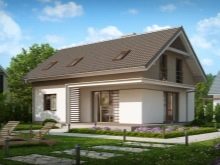
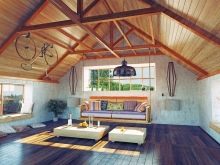
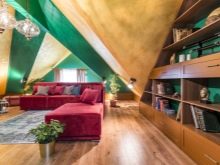
It is worth considering the decorative effect of the unusual configuration of the ceiling and walls. This interior looks more original than the usual rectangular layout. Being in a beautifully designed attic floor is an aesthetic pleasure. In such rooms, a special atmosphere is created.
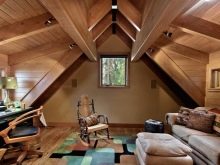
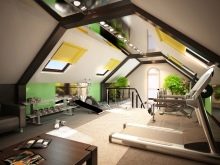
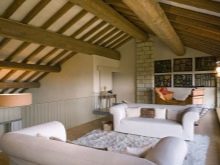
Advantages and disadvantages
The attic has a number of advantages, while it is not devoid of disadvantages. To make an informed choice of a decision in favor of a full-fledged floor or finishing the attic space, you need to study all the nuances.
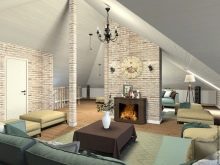
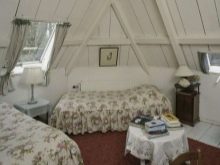
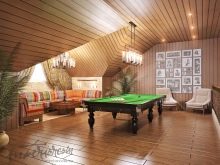
Square
The area of the rooms under the roof will be smaller than normal rooms due to the roof slopes. When arranging, there will always be unused blind areas. The ceiling and walls will not have the same height over the entire area, this will impose certain restrictions on the interior design. We will have to apply special architectural maneuvers to master all the possibilities of location under the roof. In traditional layouts, it is easier to use space when arranging furniture.
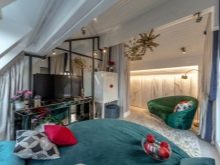
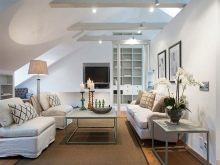
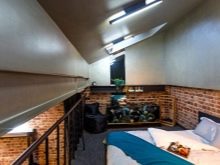
Lighting
Illumination from beveled windows will increase due to the inclined position of the glasses. The vertical arrangement of the window leaf transmits a smaller percentage of light. Skylights can be installed in the attic. This is a great advantage and expands the possibilities of the functional use of rooms for an art studio, home observatory or winter garden. In some cases, the roof dome is made completely transparent for intense insolation.
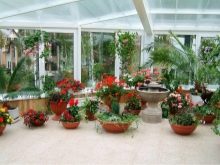
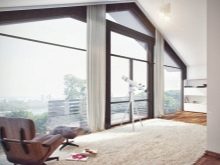
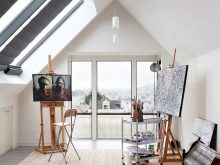
Weight load
The load on the foundation in the case of the construction of the second floor will increase, the insulation of the attic will not affect the bearing capacity of the foundation. No additional work is required to strengthen the structures of the bearing supports or the walls of the first floor. There is no need to install ceiling slabs in the attic structure. The cubic volume of air in the attic is less with a low roof. If the roof is high, the ratio may be in favor of an attic space. Heat loss with proper insulation will be the same both in the house and under the roof.
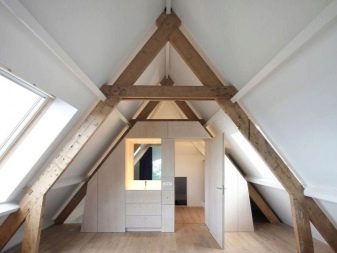
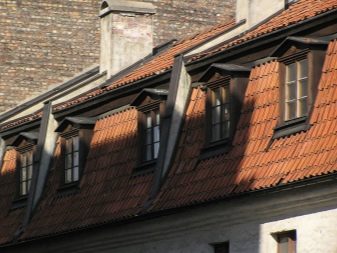
The cost of building materials
The cost of building a second floor is much more than remodeling an attic for living rooms. A two-storey house looks more solid, a house with an attic looks more elegant and graceful. The types of glazing, the presence of a balcony, the location of the stairs and the structure of the roof play an important role in the aesthetic perception of the attic building.
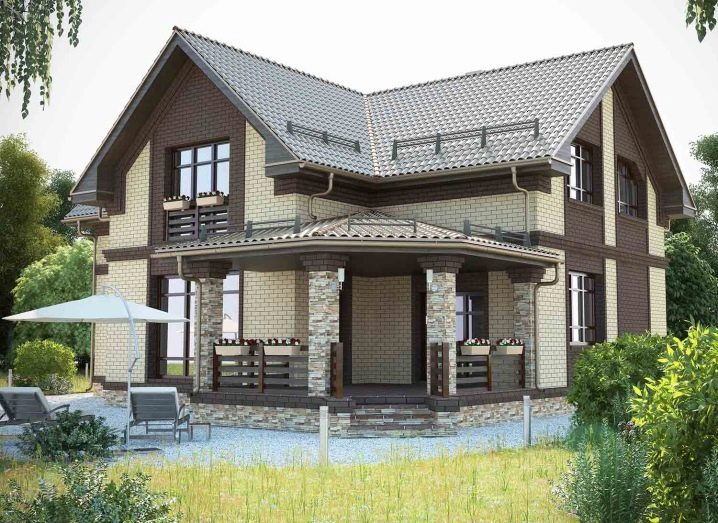
Types of structures
The types of roof structures are varied. Typical varieties for private (civil) construction have an advantage.
The most common option is gable roof... Floor beams allow you to equip a simple rectangular room with symmetrically beveled walls. A gable roof attic is easier to adapt for living. If you have a sufficient size, you should not neglect the device of an open veranda.
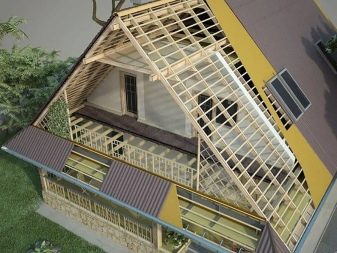
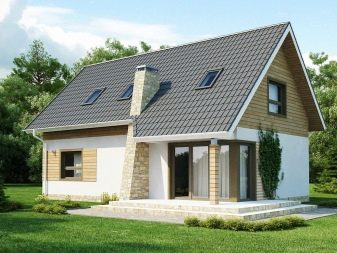
Another common option is pitched roof... Its height does not always allow equipping a living space that meets the standards. Therefore, the presence of an attic should be planned at the design stage. In this case, the slope of the slope is made steeper in order to free up more space for living. It will be possible to actively use the space only on one side.
The shed roof can be equipped with skylights or panoramic windows.
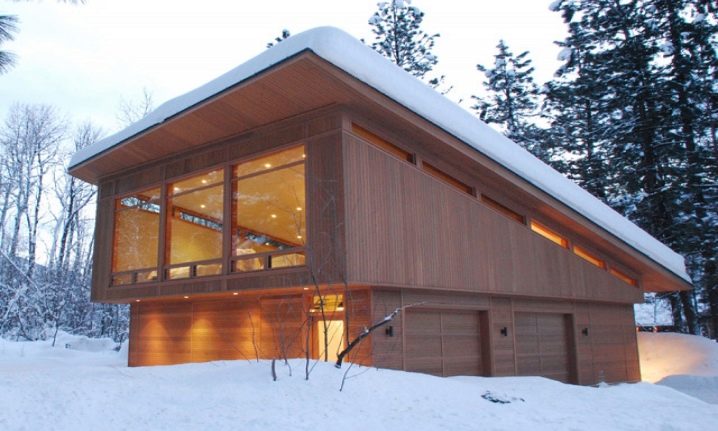
Complex multi-gable roofs... The presence of a large number of floor beams will clutter up the interior space. Some areas will be low, in other places the ceiling will have a slope, there will be a large number of blind spots, sharp protrusions that can cause bruises when using such a room. When deciding on the device of the attic, one should evaluate the height and sufficient size of the future room under a complex roof.
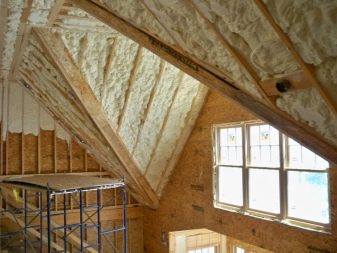
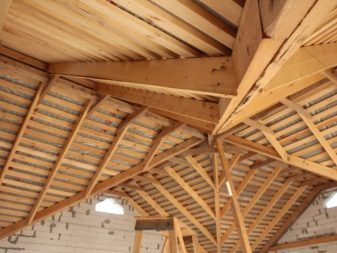
Vaulted roof is a fairly good option for the attic floor. The vault gives a great height to the walls and ceiling. The layout is symmetrical, the central part of the room is accessible for intensive use. The dimensions of the attic rooms differ little from the traditional types of premises. Vaulted roofs allow you to beautifully decorate the domed roof of the attic.
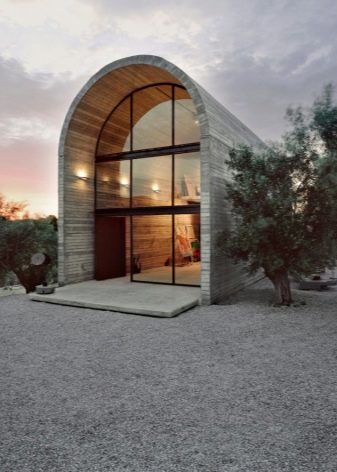
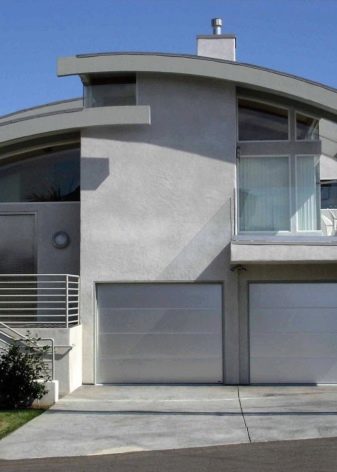
The most suitable for the attic floor is gable roof... The design of such floors is simple, the arrangement of the beams for the improvement of the internal space is more convenient. There are no extra corners, there are almost no blind zones. The side walls are of sufficient height, 80% of the three-pitched attic room can be fully used.
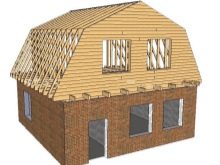
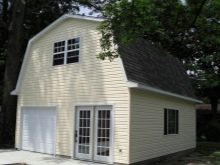
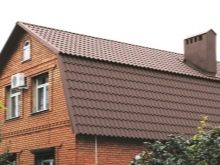
Dimensions (edit)
In addition to the configuration of the roof structure, the type of attic floor is determined by the height of the walls. According to SNiP, a full-fledged floor corresponds to a wall height above 1.5 meters. The attic floor corresponds to a height of 80 cm - 1.5 meters. A room with a wall height of less than 80 cm does not affect the number of storeys of the building.
For the attic to be recognized as a living space, a number of conditions must be met. Most of the room should have a height of at least 2.3 meters, while the minimum area should be 16 square meters. With an increase in the height of the room, the area can be proportionally reduced to 7 square meters. A small room can be set aside for a bedroom or an office, this will not contradict SNiP. It all depends on the indicator of the cubic volume of air as applied to living rooms.
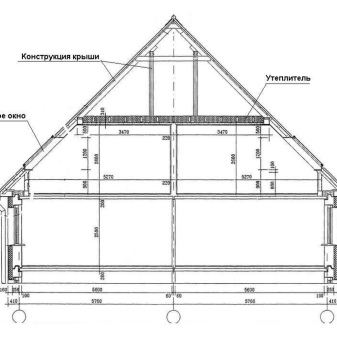
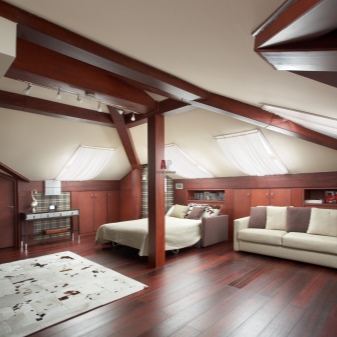
The dimensions of the attic usable area depend on the angle of inclination of the roof, its height and the size of the attic. Experts do not recommend making the roof height more than 3.5 m: a higher roof will require a reinforced constructive solution. A small (below 2 meters) gable roof may not be suitable for a heated living room at all. Such an attic can be landscaped and used in the summer as a place to relax. Insulation and heating of a low attic will require large material costs, and will bring little practical benefit.
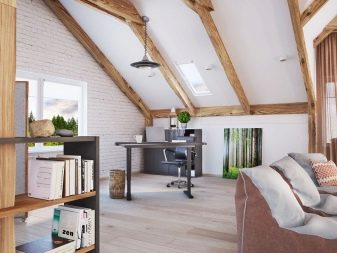
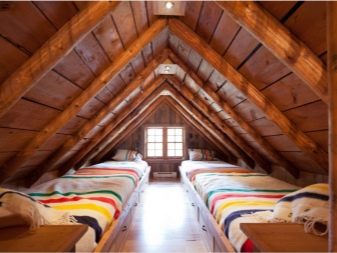
It will be uncomfortable to live in a low and narrow room with a sloping ceiling. At best, you can only sleep there. Construction materials and finishes directly affect the cost of construction. It is impossible to save on some structural elements: the safety and duration of the object's operational life depend on this.
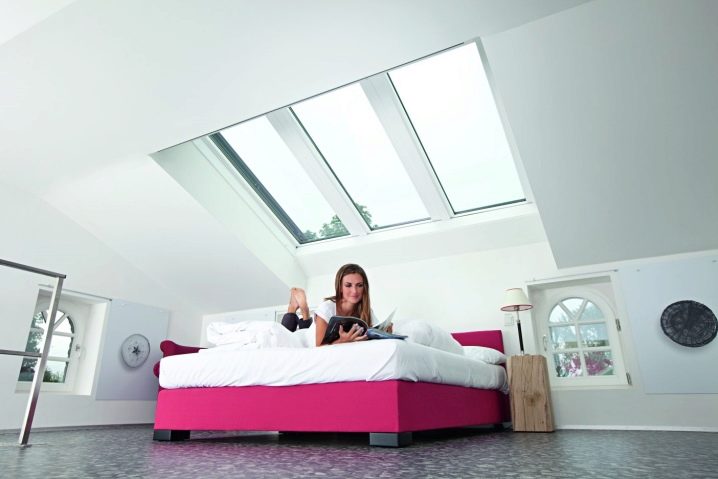
Materials (edit)
Materials are selected taking into account the bearing capacity of the foundation and walls. For their purchase, you can consult with specialists. The specificity of the attic lies in the fact that it is located on the upper floor, its weight presses on the lower structures. For example, if you want to adapt a basement floor for housing, you have a full range of heavy building materials (from concrete foundation blocks to boulders) at your disposal.
The attic will require lightweight structures. For the construction of rafters, the most common materials are timber and metal structures. The roof can be made of a budget metal profile, metal tiles. It is an easy-to-install, high-quality, durable material with good aesthetic qualities. Its external finish can imitate natural materials, it is distinguished by a variety of colors, if necessary, it can be easily repainted to the desired tone using paint and color scheme.
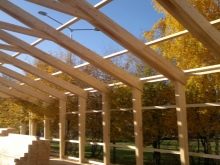
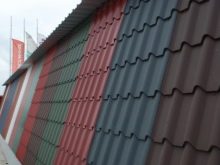
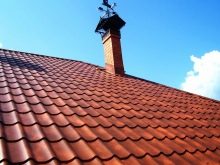
The main disadvantage is noise during rain.If there is a living room downstairs, you will not be able to completely isolate the noise. Steel seam roofing has the same disadvantages. For roofing work, a team of specialists is needed: the sheets are connected to the folds on the ground and only after that the fragments along the length of the slope are lifted to the roof. Flexible steel allows you to cover vaulted and domed roofs.
Natural tile is a beautiful, but quite expensive and time-consuming material to install. Slate is considered a budget alternative. These materials are capable of isolating noise and trapping heat. Slate is not recommended for use in residential buildings due to the content of asbestos. Roofing material is laid between the crate and slate (tile).
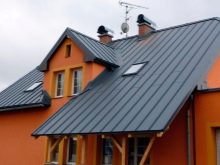
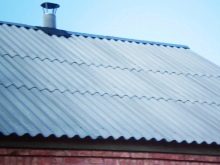
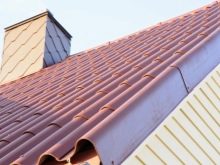
A relative of slate is ondulin. It is flexible, lightweight, easy to install, soft material. It almost does not conduct noise, due to its flexibility it is used in the installation of complex roofs. The disadvantage is high flammability (ignites at 110 degrees), in the heat, the smell of bitumen is emitted.
Flexible shingles are becoming very popular. In its composition, it has a fiberglass with a layer of bitumen with a modifier. A layer of basalt or slate chips is applied on top. A layer of natural mineral chips provides protection from noise and cold, resists mechanical damage.
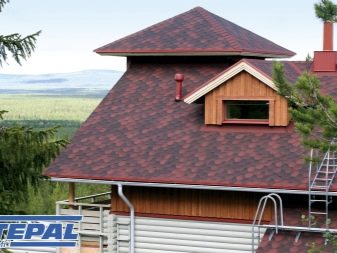
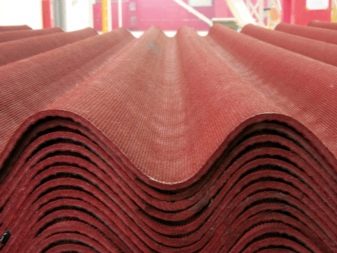
Nuances of material combination
Knowing all the features of the roofing material, you can choose the right option.
The style of the main building should also be taken into account:
- Brickwork looks harmoniously with green or brown artificial tiles.
- It is better to combine plastered facades with ondulin or a metal profile.
- The roof, finished with natural or artificial tiles, looks organic on a wooden log house.
- Stone and glass are related materials; in brick houses, glazing bears a great aesthetic load.
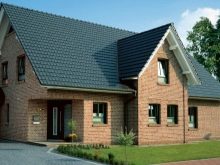
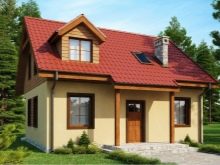
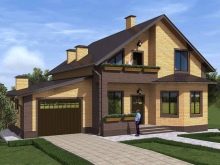
By glazing the end wall of the attic, two tasks are simultaneously solved: a decorative function and an increase in the degree of illumination of the interior space. One of the most effective solutions for the exterior and interior is the construction of a skylight or glass dome on the roof.
Ondulin has proven itself well. A rare roofing material is a thick layer of specially treated reeds. The reed reproduces the appearance of a thatched roof. It is more durable, fireproof, retains heat well. Its aesthetic qualities are on top: the reed emphasizes the original national style. To implement all this in your own home, you need to calculate the structures, make an estimate for the types of work and necessary materials, prepare project documentation for the official registration of the attic floor.
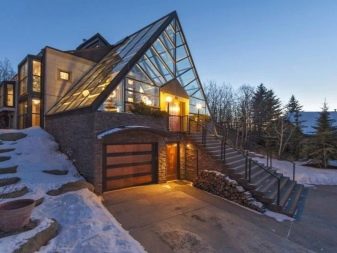
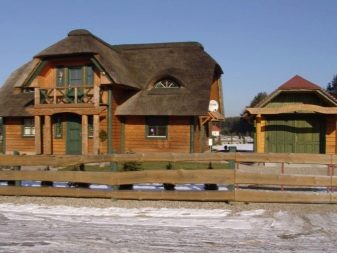
Projects
Requirements for living quarters are regulated by regulatory documents. Failure to comply with the requirements can lead to an emergency state of the entire house. If you can build the attic floor yourself, then it is better to order the correct design documentation from the architecture department. In the first design phase, a roof configuration is selected.
The choice is based on the design features of the house, determined by:
- possible availability of living space;
- the number and size of the rooms you want;
- the place of installation of the stairs inside or outside the house;
- the presence of a balcony.
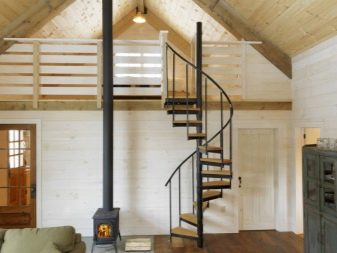
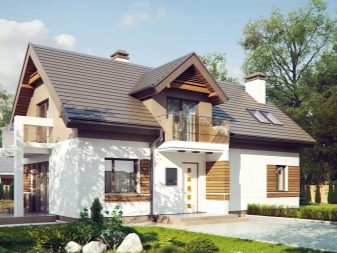
Next, they calculate the wind and snow loads of the region, the temperature seasonal regime. The minimum required angle of inclination of the roof depends on these indicators. Then the roofing material is selected, which depends on the angle of inclination of the roof slope. For a metal profile, an angle of 4 degrees is sufficient; for tiles, a slope of at least 25 degrees is required (to prevent leaks).


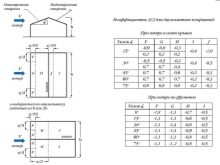
The next step is to calculate the bearing capacity of the walls and foundation of the building. If the walls of the first floor were made of porous material, you can get a refusal to build an attic building.At this stage, it is possible to increase the size of the attic floor by moving one or two walls of the attic and part of the roof above the open terrace of the first floor. Therefore, a separate calculation is made for the bearing supports for the outrigger attic.
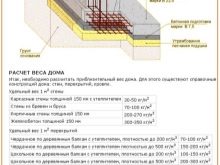
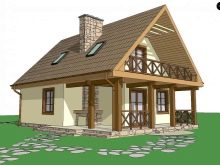
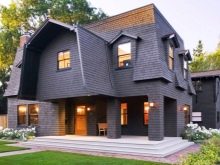
The required number of window openings is laid in the project. If the step of the rafters allows, they try to place window openings without violating the structural integrity of the rafter system. If it is necessary to move apart or remove some of the beams, the risk of disrupting the uniform distribution of the load on the walls of the lower floor is calculated again. The type, size and shape of windows depends on the location of the structural supports of the roof.
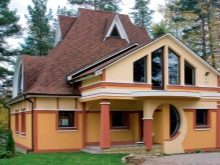
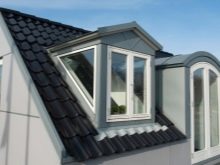
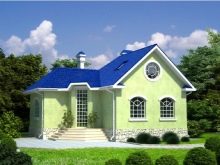
The surface area of the glass for the transmission of natural light must be at least 12.5%.
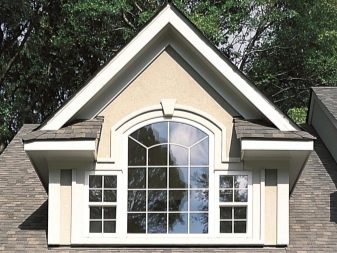
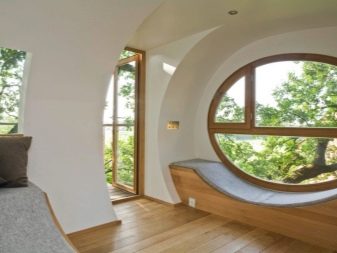
The question is being decided whether the frames will be outboard. In this case, you will have to create special add-ins for them. If the glazing sheet is located in the roof itself, the load from the weight of the frame structure will be added to the weight of the roof. With a large area of glazing in the plane of the roof of the frame, a significant mass is added: the glass unit in the frame is a rather heavy material.
The simplest calculation is made for a gable roof: the more slopes, the more difficult it is to determine all the components. The gable symmetrical roof allows the load to be distributed evenly along the length of the wall. The shed roof has the most uneven weight distribution. This option is rarely used under the attic, as it requires a greater slope of the roof. Not every building has the technical ability to load the bulk of the roof onto one of the walls.
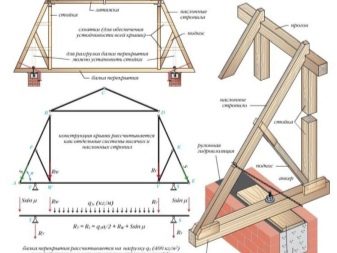
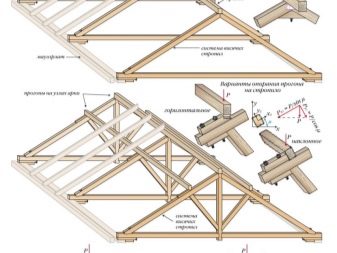
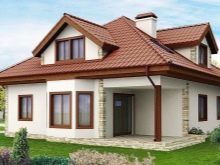
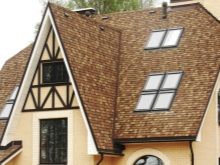
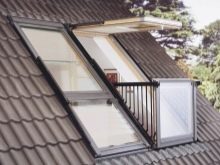
In the final form, the project documentation contains a plan of all floors and a drawing of all facades of the house. Separately, a drawing is made of the structural solution of the roof. At the summer cottage, it is not necessary to make complex calculations. Here you need to be guided by common sense and initial knowledge of the resistance of materials to loads. For a capital attic, it will be necessary to take into account in the design and estimate work the heating scheme, waterproofing, sound insulation, the method of ventilation and insulation of the internal walls, as well as other necessary work in each specific construction site.
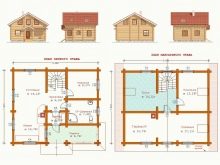
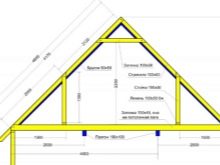
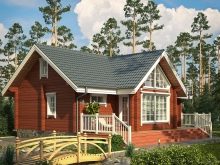
Arrangement
In winter, the inner space of the attic experiences a thermal load through the lower ceiling and a wind, low-temperature load through the roof. For a comfortable stay, these two components must be neutralized with insulating materials. The main task is to insulate the upper floor of the attic rooms: it is through the roof that the main heat losses occur in winter. Each part of the attic floor is insulated according to its own wall scheme (roof slopes).
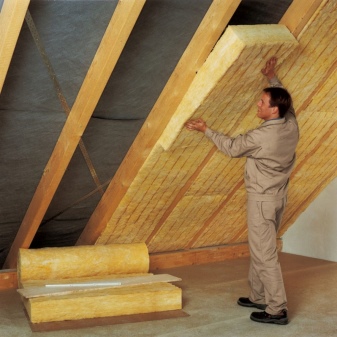
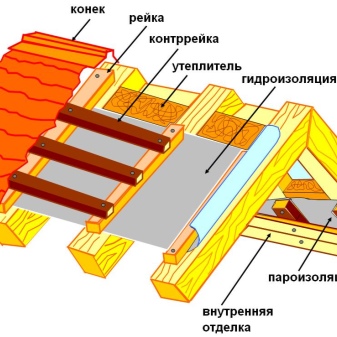
The thickness of the insulation in the middle lane is from 100 to 200 mm, in the southern regions 100mm is enough. This material not only protects from the cold in winter: in the summer heat, it isolates the flow of hot air into the room under the roof, due to which sound insulation will be provided. Of the wall insulation materials, the most demanded are foam glass, foam plastic, mineral wool. The recommended value of the thermal conductivity coefficient should not exceed 0.05 W / m * K.
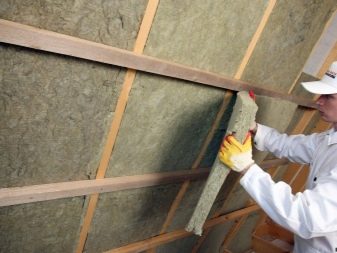
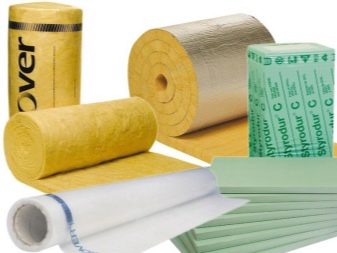
Styrofoam
Polyfoam is the cheapest of the materials. Its insulating qualities decrease over the years, the size shrinks, gaps are formed through which cold or hot air enters. But foam insulation is a simple and not laborious procedure.
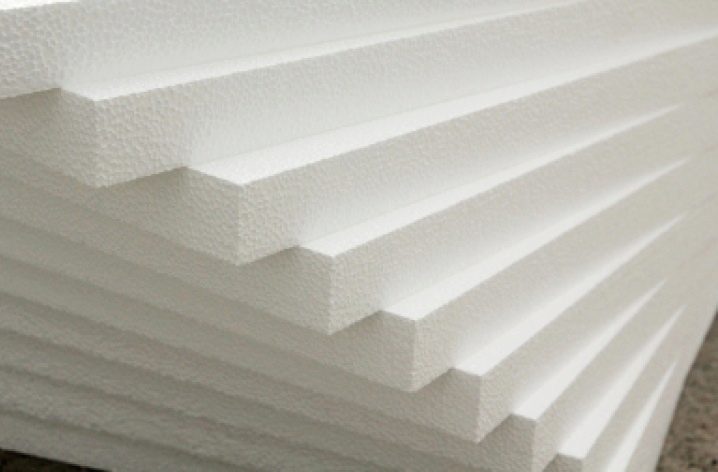
Expanded polystyrene
Expanded polystyrene has a longer service life. The joints do not form gaps, reliable sealing is ensured for many years. The disadvantage of the material is its high flammability (it is undesirable for them to insulate wooden attics).
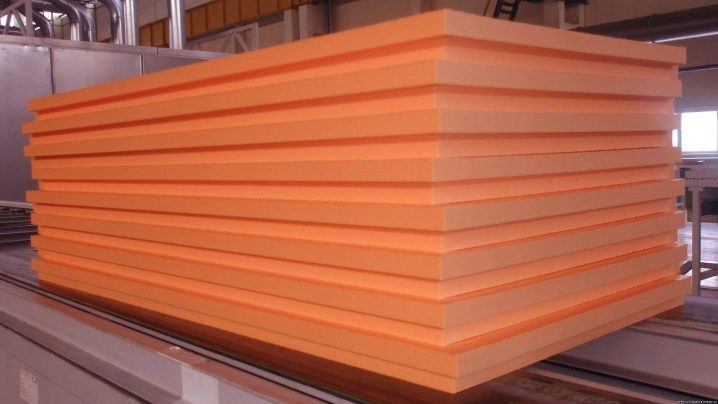
Polyurethane foam
Today, the popular use of polyurethane foam in the form of spraying on internal structures. When solidified, the mass creates a dense impenetrable surface without gaps and crevices.This is a fairly durable material, but it must be used carefully in rooms with open fire (for example, where there is a fireplace, stove, gas).
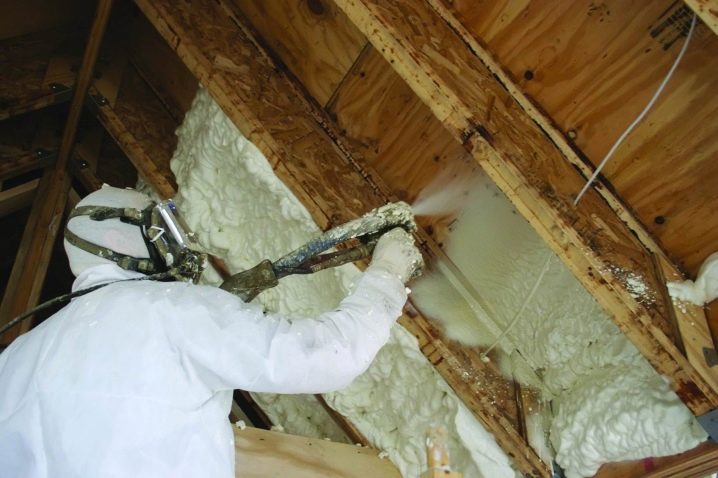
Mineral wool
Mineral wool is considered the most environmentally friendly material for thermal insulation. It is a moisture-resistant, non-flammable material, easy to install. The cotton wool expands and fills in all the voids between the outer finishing layers. It has sound insulating properties, which is especially important when using a metal roof.
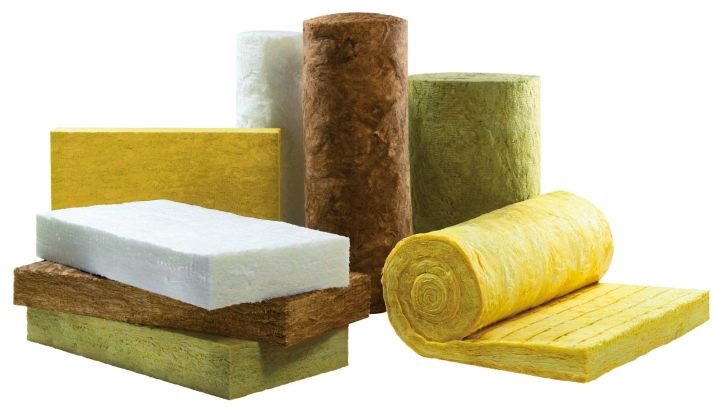
Ecowool
The most expensive and harmless material is ecowool. It has universal properties, but insulation with ecowool requires special equipment, since the insulation has a fine-grained structure in the form of flakes.
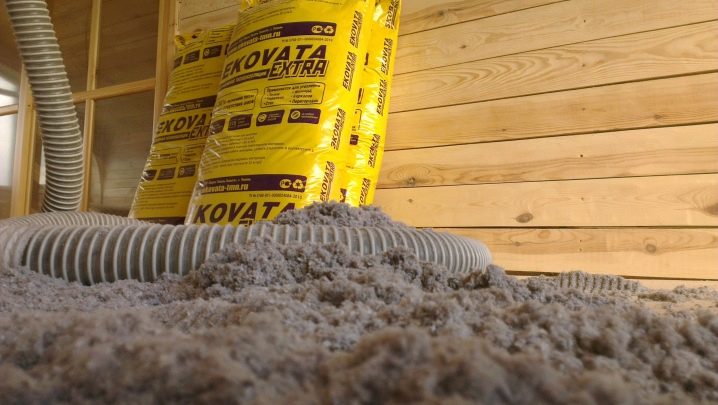
Providing hydro, noise and vapor barrier
Insulation works are combined with waterproofing, soundproofing and vapor barrier works. Waterproofing protects against moisture penetration into the ceiling.
Wetting and freezing of the insulation in winter will cause:
- destruction of the insulating material;
- freezing of sections of the wall or ceiling;
- the development of mold and leakage.
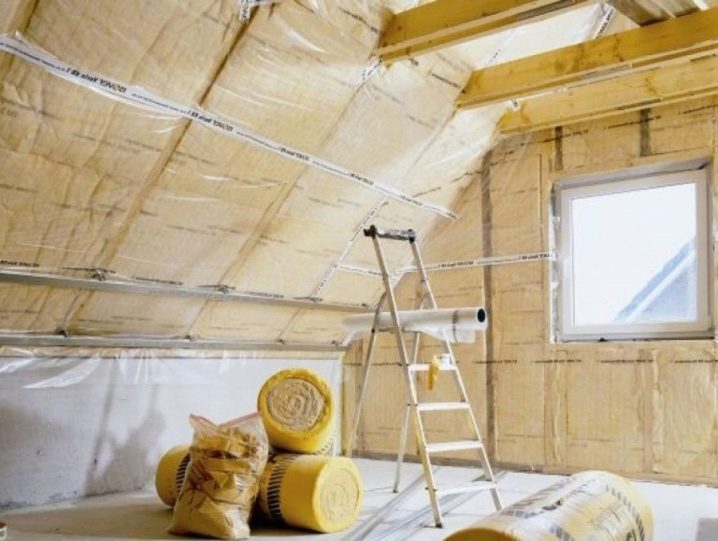
For waterproofing, anti-condensation, diffusion and superdiffusion breathable films are used. The vapor barrier protects the insulation material from the inside of the room from the penetration of moist warm air deep into the insulation. Glassine and isospan are used more often.
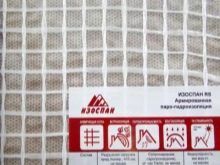
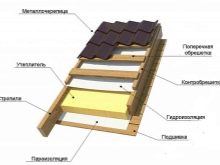

It is also important to organize a ventilation system in the attic floor to ensure the flow of fresh air.
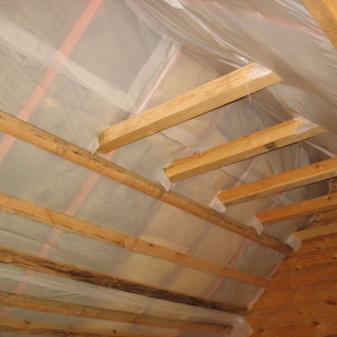
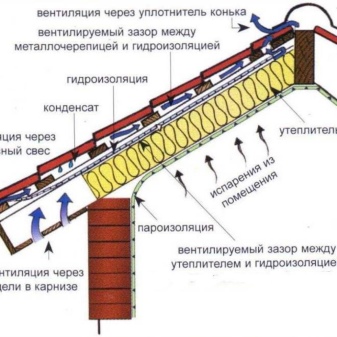
Floor insulation
Insulation of the floor is done in the same way as the insulation of the interfloor overlap. An ordinary screed is made on a concrete slab and a finishing material is mounted on top. For cold regions, it is worth making a warm floor together with the screed.
For wooden floors, the following work procedure is provided:
- the subfloor is treated with an antiseptic;
- lay a waterproofing film (you can use an ordinary thick polyethylene film);
- followed by an overlap vapor barrier membrane;
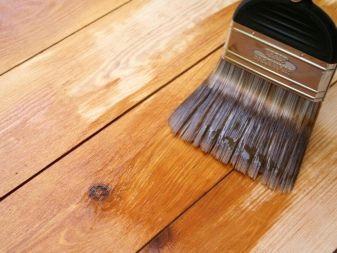
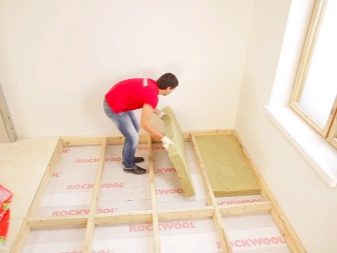
- any available insulation is placed between the lags, on top - a layer of vapor barrier;
- the entire puff filling is sewn up with a rough floor.
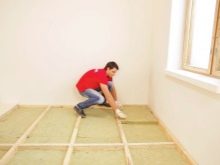
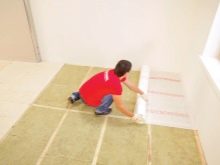
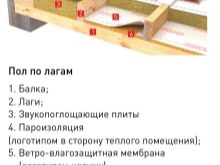
The floor is ready for finishing.
We insulate the walls
On the inside, waterproofing is attached to the roof using slats, the entire space between the timber is covered with a 100 mm layer of insulation. The second layer is placed on the first with a ventilation gap. The gap can be provided with a rail. From above, the entire surface is covered with a foil membrane (metallized side inside the room). The membrane is secured with a stapler. The finishing layer is made of plasterboard, wooden or plastic slats, OSB boards.
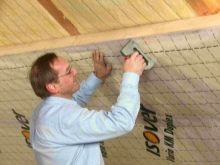
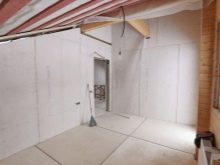
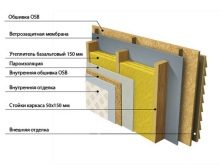
Leave a small distance between all layers for ventilation., which is ensured with the help of slats, since a large temperature difference is formed between the outer and inner sides of the roof. If there are several rooms in the attic, the frame of the interior partitions is erected before the walls are insulated. Partitions are insulated in accordance with the requirements of SNiP. At the last stage, the heating system is mounted and cut into the central highway of the house.
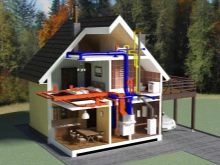
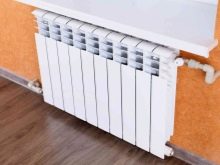
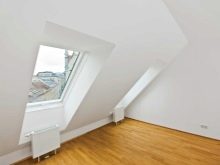
Plumbing and sewerage are installed if a bathroom and a toilet are planned in the attic. The kitchen is rarely raised to the attic. With this planning option, you need to make a complete ventilation system with a ventilation shaft. It is worth using fireproof finishing materials.
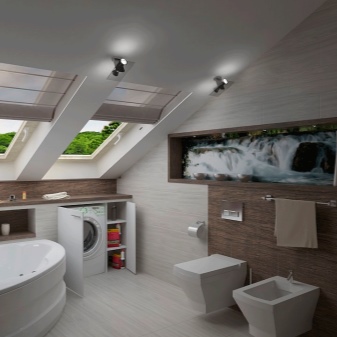
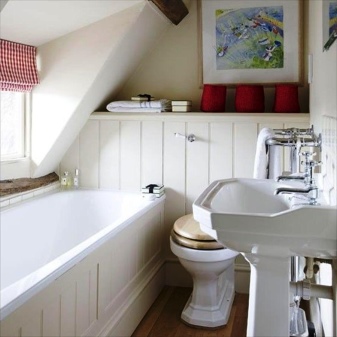
Room design
The unusual arrangement of the walls and ceiling of the attic floor makes special demands on the organization of the interior space. When arranging rooms for different purposes, it must be borne in mind that one or both walls will have a slope inside the room below human height. Excessive use of such areas can result in inconvenience and injury. It is necessary to correctly distribute functional areas so that the maximum area of the room is comfortable for movement.The equipment and decoration of the attic floor depend on the specifics of the room. But there are general rules for interior design.
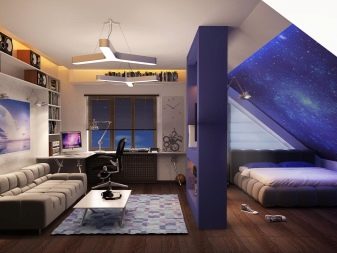
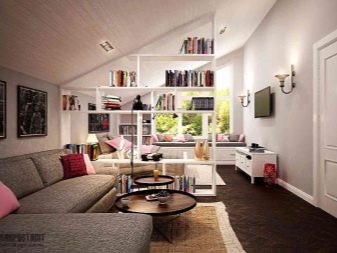
The light color of the finish makes the room larger. Low attic ceilings should not be painted in dark colors. The limited use of black, blue, green tones is possible when duplicating this color on the floor and painting the walls in white (light) color. The abundance of dark tones will visually make the space limited and uncomfortable.
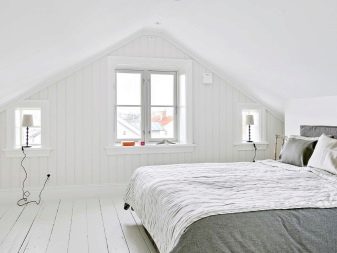
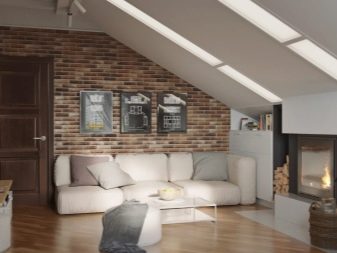
If the rafters have a beautiful wood texture, there is no need to sheathe the beams with finishing material. In rural styles in many countries, beams add brutality to the interior and serve as a constructive decoration of the space. This is typical for Provence, country, Scandinavian and Mediterranean styles. By adding traditional household items to the interior, the summer attic will turn into a favorite room for households and guests.
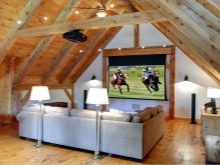
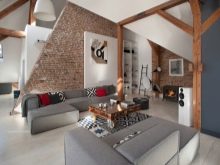
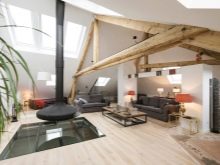
When choosing one or another interior decoration material, you need to study its moisture resistance. For unheated attics, frost resistance is required. For example, wallpaper in a cold and damp attic can come off in damp autumn weather; stretch ceilings cannot always withstand low temperatures.
Wooden and plastic rail will last for many years. A budgetary and practical option is to paint surfaces with moisture-resistant paints and stains.
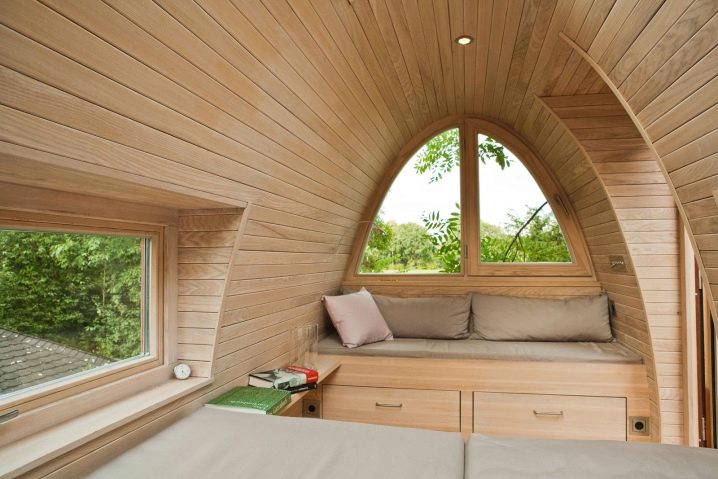
The attic has a very original design, unlike an ordinary room. Here you can give free rein to your imagination, use the bending relief of the ceiling and walls to create a unique design. Having conceived a design constructive solution, it is better to turn to professionals to draw up a competent project with the calculation of the material: complex shapes are difficult for beginners. It will cost a lot, however, to get a really beautiful ceiling and walls, you should trust a specialist.
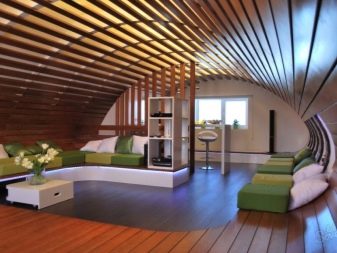
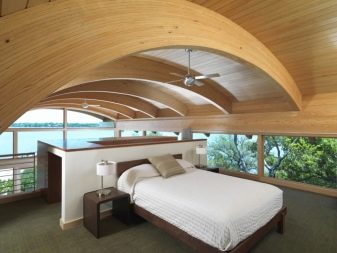
Bedroom
An attic bedroom is a practical and comfortable solution. In the bedroom we relax, change clothes (the place does not require extra space). In the attic with a gable roof, you can place a bed in the center of the room. It is better to pick it up without a footboard, since the height does not always allow you to approach the bed from the side. For older people, such an arrangement of a sleeping place will be inconvenient, but young people or adolescents will like such an original bedroom.
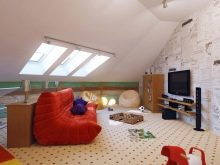
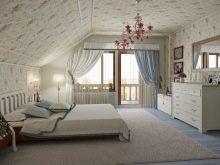
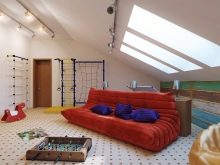
If you decide to install a skylight in the plane of the roof, you will get an unsurpassed unity with nature.
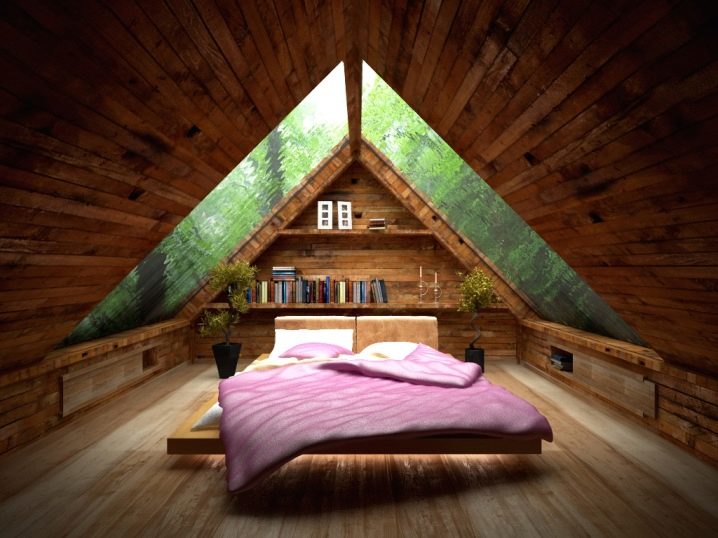
In the attic, formed by a complex roof, a small sleeping area is allocated. The bed has a headboard to the bevel. On the contrary, they form a dead zone, which is used for a TV or a stand for clothes. So it is convenient to approach the bed, the ceiling is higher in the central part. The style of decoration of the 60s of the last century gives this room a certain history.
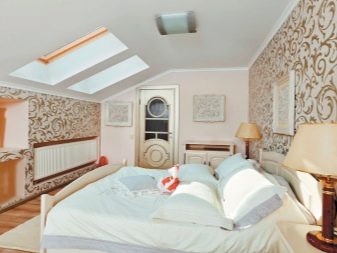
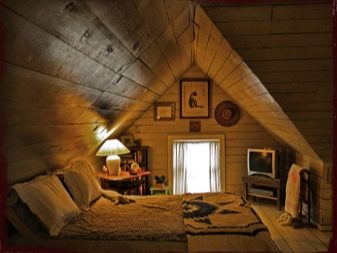
You can use the blind areas under the roof slopes to accommodate the bed (a lying person does not need a height of 2.5 meters). For larger rooms with one sloped wall, a traditional bedroom design is a good solution. For example, the walls can be pasted over with wallpaper, choosing furniture in the classic style for the interior. The sloping area of the ceiling can be highlighted with a bright contrasting color (to avoid bruises).
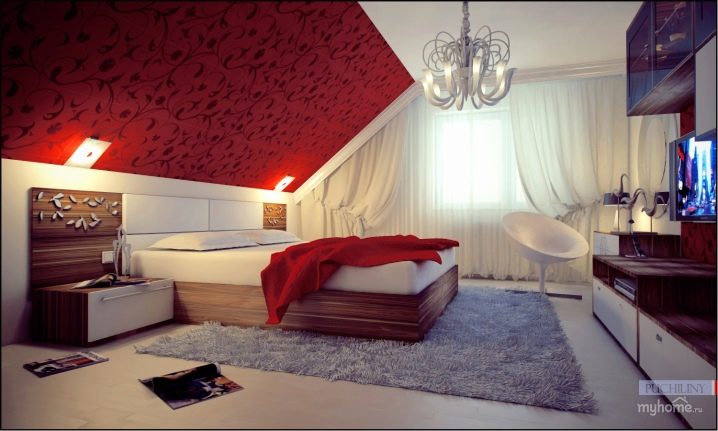
If there is not enough storage space, all blind spots must be filled with a combination of lockers. So the useful return of the low sections will be greater. Any thing can be taken without getting out of bed if the lockers are conveniently located on the sides of the berth. The calm decoration of the walls and ceiling will not draw attention to the height of the room. The color of the bed is worth highlighting.
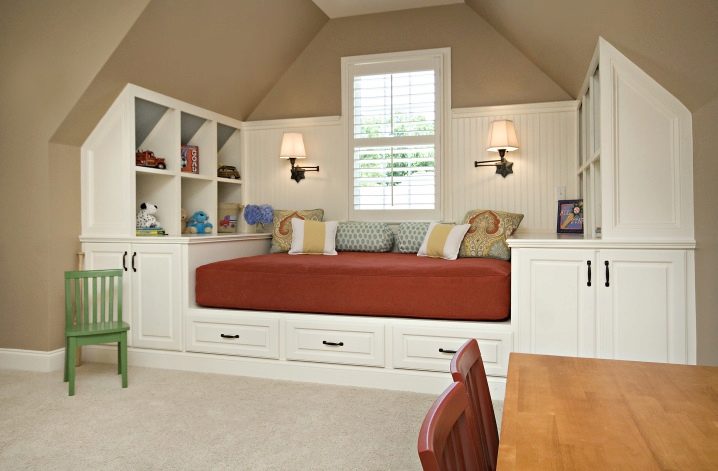
Restroom
The attic recreation room attracts with its unusual shape. The intricate designs of the roof slopes distract from everyday worries, add a note of exoticism and a radical change of scenery.It is worth giving one wall under the tape glazing, the sofa can be placed in the lowest part opposite the screen of a huge window: this way you can admire the landscape and have intimate conversations. In such a room, you can surrender to your favorite hobby.
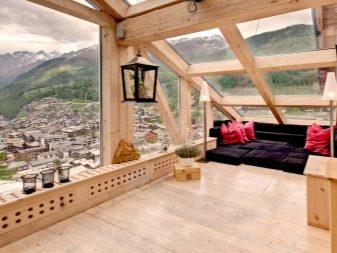
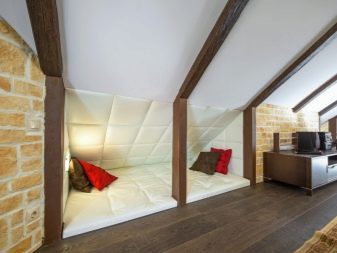
On the top floor, the arrangement of the observatory suggests itself. Households will not be often distracted, busy with their own affairs on the lower floor. The entire starry sky will be at your disposal. You just need to stock up on equipment for observing the starry sky.
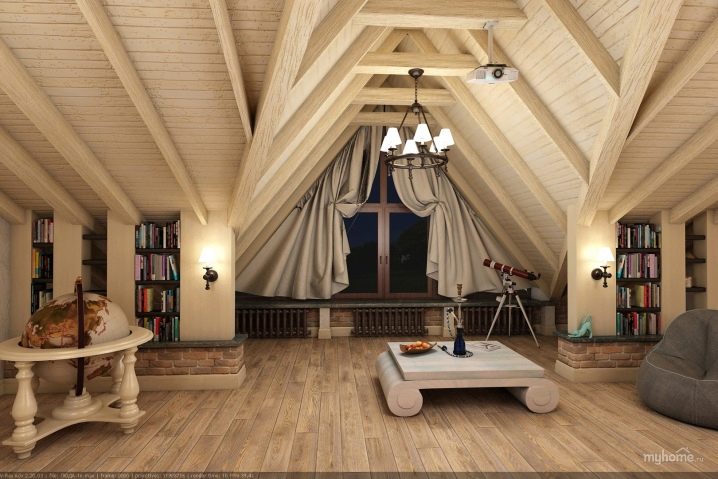
If it is not possible to make windows in the attic floor, all households and friends will vote for a home theater device. In the dining room and living room on the ground floor, older family members can discuss gardening successes, and children can play board games. Upstairs in the attic, you can follow the progress of sports with enthusiasm without muffling the sound. The whole family can watch historical records of the graduation of children or parents' weddings, teenagers with friends can arrange a home movie screening. The walls here are painted in a neutral monochrome color scheme, a screen is placed on the end wall, and comfortable chairs are placed opposite.
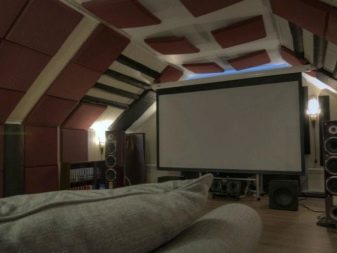

Living room
The attic can be a fairly spacious and high room. You can equip it in a Scandinavian style. Light colors of furniture upholstery, walls and ceiling are tinted in beige or gray. Wooden structures must be treated with a light-colored stain. The walls are finished with light decorative stone. For contrast, add a few dark furnishings. For unheated rooms, a good solution would be to install an electric fireplace, in cool weather it will warm the room and add coziness.
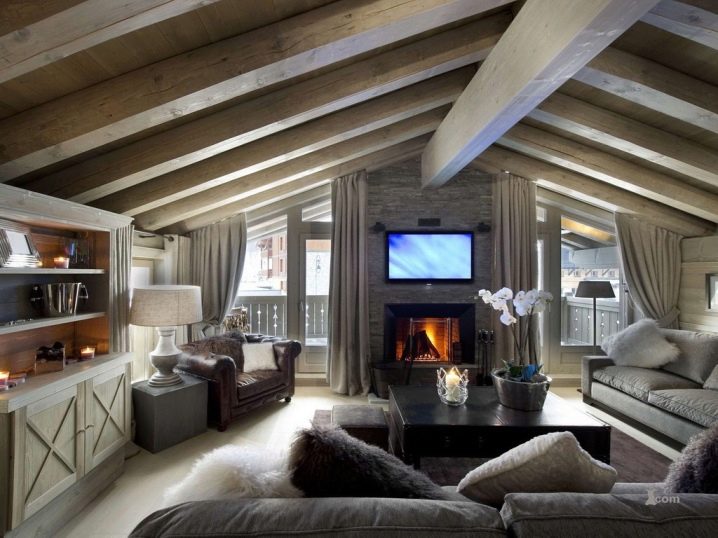
An ultra-modern minimalist living room is easy to equipusing only white and clear glass. Furniture is selected in simple shapes with monochrome upholstery. Glass tables do not clutter up the interior. The rest of the space remains empty. The windows are not decorated with curtains so as not to restrict the access of light.
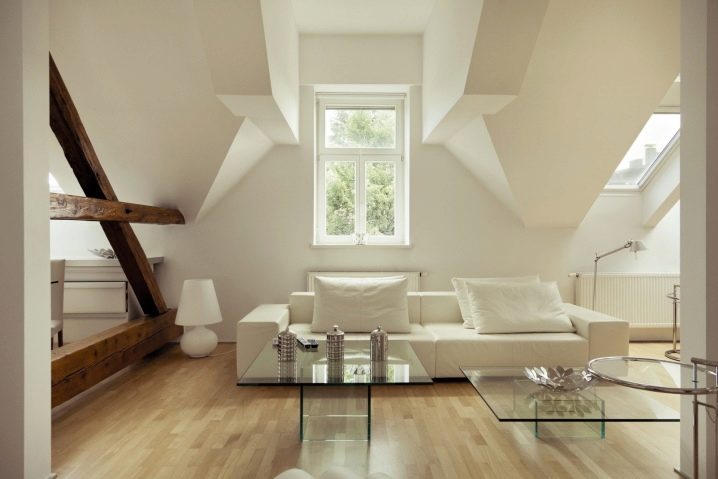
A large hall under a complex roof should not be divided into several small nooks. Sofas are installed in low areas. Fractures in the ceiling are emphasized by lighting systems. At first glance, there is not much decor, so as not to divide the space. A limited number of colors and textures are used for finishing.
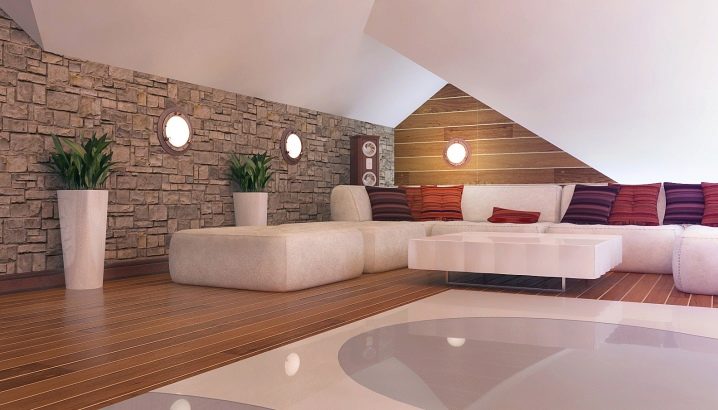
Children's room
It is common knowledge that boys are very fond of attics and tents. A room for a child, equipped in a summer attic in a nautical or pirate style, will satisfy the request of little adventurers. In the design of the attic, bright colors and wallpaper are appropriate. The bed and the study table are installed in low areas, and storage space is also placed in them. The central (highest part) is left free for active games.
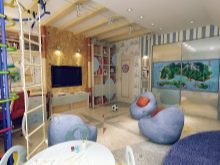
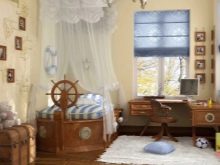
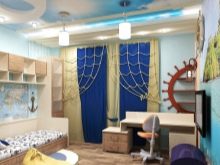
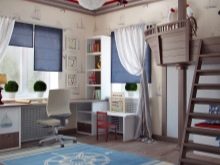
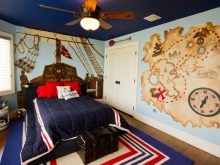
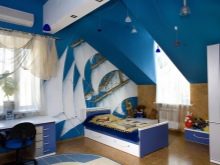
Delicate pastel colors should be added to the interior of the girl's room. Use the technique of placing furniture along low walls. The white tone of the walls visually increases the size of the room, the floor beams are sewn up with plasterboard. Wallpaper with a pattern of pink, light green and yellow vertical stripes is glued to the vertical walls, which visually makes the wall taller.
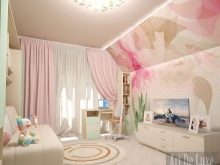
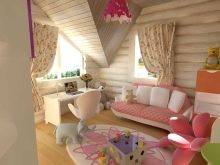
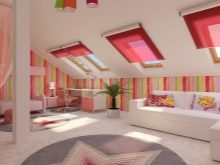
Cabinet
Arranging a study in the attic requires good natural light. It will be necessary to provide for the presence of a sufficient number of windows during the construction phase.
In the evening, two lighting systems should be in operation:
- central bright (for business negotiations);
- desktop (for concentrated work).
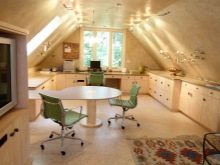
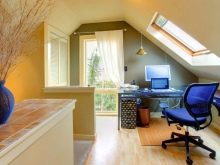
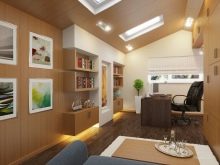
The cabinet is decorated with discreet tones of finishing cladding with a geometric pattern. It is better to choose furniture in soothing colors. Leather upholstery is appropriate. The configuration of the ceiling is preferable to a simple rectilinear one: it is unlikely that you will be able to concentrate, constantly maneuvering between sharp corners. In low places, racks with documents are installed, the table is placed closer to the window, the middle of the room is cleared for passage.
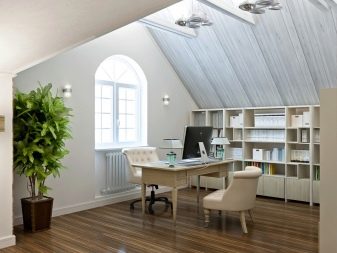
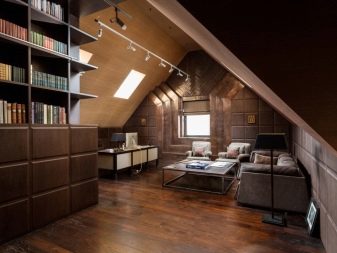
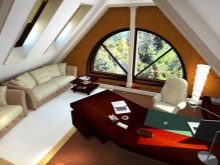
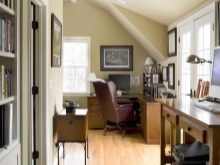
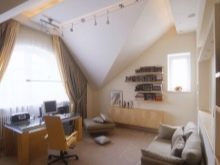
Kitchen
The kitchen in the attic is not the most convenient option, as products from the store will have to be brought to the upper floor. The cooking process requires constant movement through the space of the room. In a low room with ledges, this will be inconvenient. Such kitchens require the installation of a ventilation system and a sewer drain. This is not always justified if there is a suitable space on the ground floor.
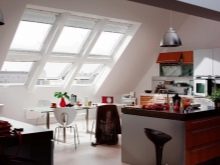
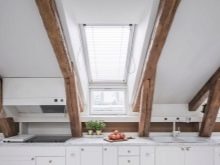
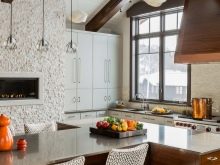
However, there are cases of the need to equip the kitchen, bathroom and toilet on the attic floor (when arranging a studio apartment). Kitchen furniture is installed along the perimeter of the walls, the center remains for the hostess to maneuver. The presence of a gas stove limits the use of some finishing materials to the degree of flammability.
Tile, porcelain stoneware, drywall, whitewash and painting are safe finishes.
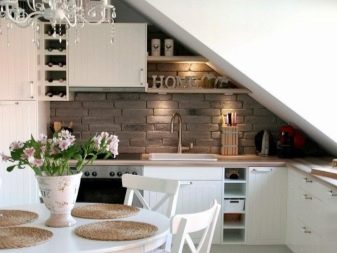
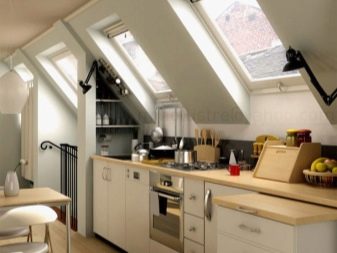
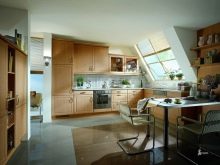
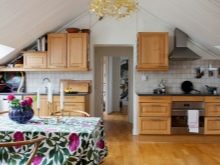
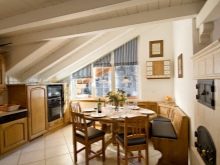
Bathroom
Bathroom and toilet do not require a large area. The broken roof structures are the originality of the design, lighting and placement of hygiene places. Ceramic tiles, mosaics, parquet boards will be appropriate in the interior.
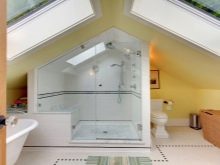
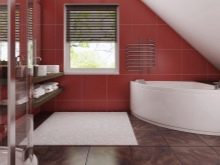
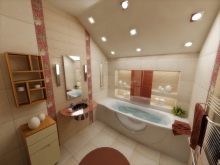
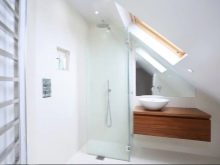
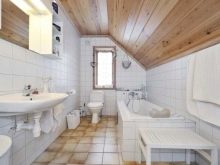
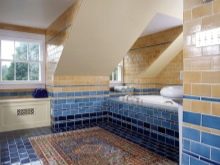
In a small room, you should not use lush decor with gilding and marble: this is the lot of large luxurious bathrooms (unless it is decided to take the entire attic for a shower room with a bathtub). You can use one interesting decor item, for example, an original stylish chandelier.
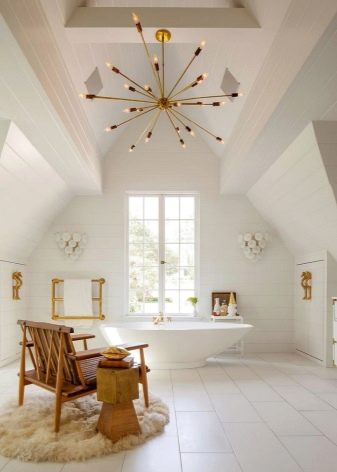
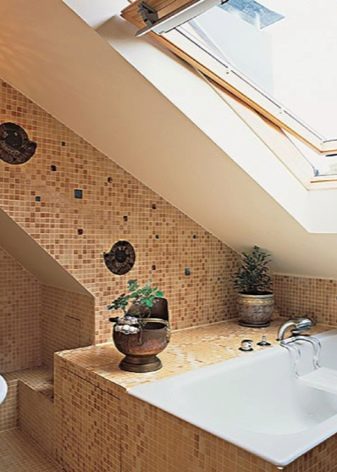
Greenhouse
The attic is an ideal place for a greenhouse. Continuous glazing and good thermal insulation are prerequisites for the correct functioning of the winter garden. An abundance of light will ensure good plant growth. It is more practical to lay the floor with ceramic tiles. Since work with the ground is coming, the convenience of cleaning the room will be required. Finishing materials are selected moisture resistant.
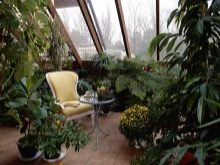
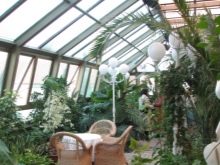
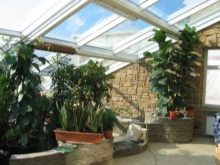
Ceiling
Ceiling decoration plays an important role in the design of the attic floor. This is one of the massive central elements of the interior (especially in complex roof structures). Designers are happy to play with this feature of the ceiling with the help of unconventional solutions. The complex geometry of the ceiling becomes the central composition of the attic space.
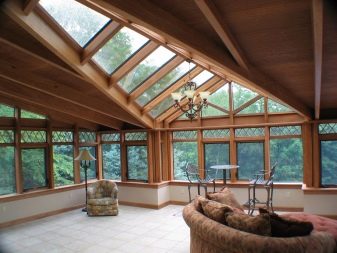
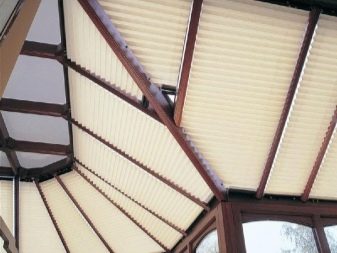
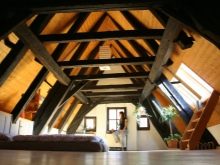
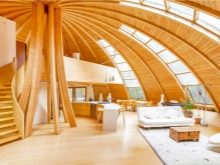
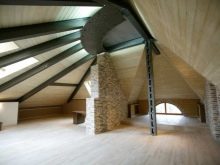
The attic floor provides the ability to install a stained glass ceiling. The stained-glass window can be made of plain or multi-colored glass. During the day, natural light will illuminate the mosaic pattern on the ceiling. Additional artificial lighting is installed in the side walls. Stained glass can be made in a specific style. The combination of glass and metal will give a high status to a simple attic space.
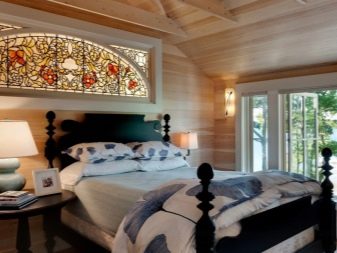
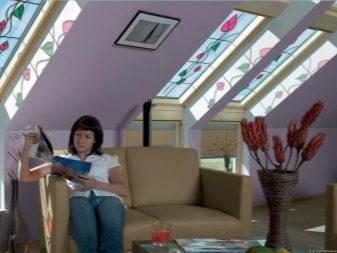
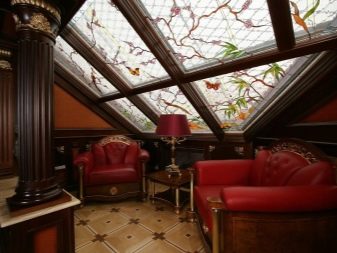
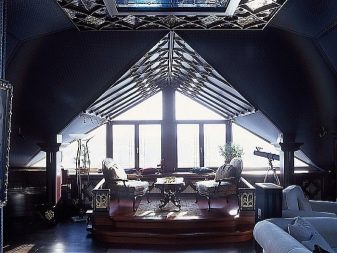
For finishing the attic ceiling, a wooden lath is traditionally used. This material is environmentally friendly and has good insulating properties. The beautiful fibrous texture of the wood will be an additional decorative element. An interesting application was received by modular mesh structures in the form of a suspended ceiling.
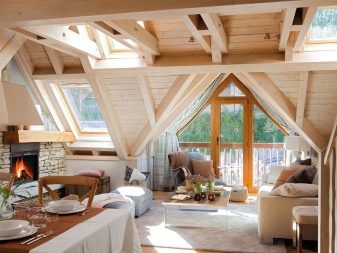
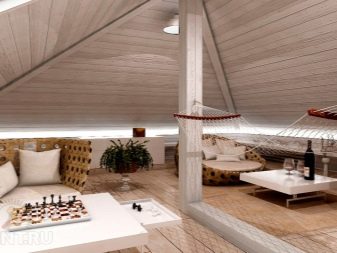
A budget solution would be to cover walls and ceilings with PVC or foam tiles: they imitate various natural materials and have a rich palette of colors. The limitation is the assessment of the conditions of use for the release of harmful impurities when heated.
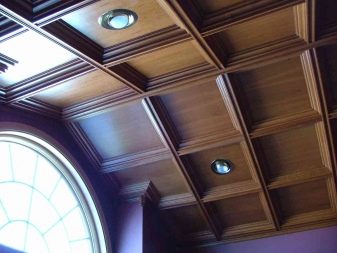
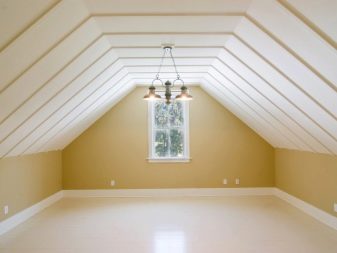
Stairs
A staircase to the upper floor connects the two spaces. Its design should be compositionally suitable for the attic and the lower floor. Stairs carry not only a decorative load: their main task is to provide a reliable, safe and comfortable ascent to the attic. Ladders are spiral, marching, and rectilinear.
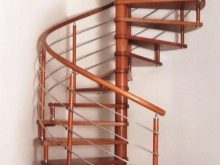
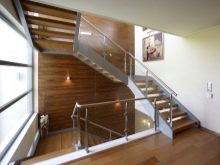
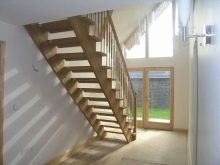
The choice is determined by the convenience of the design and its location. For summer cottage unheated attics, automatic folding stairs or external structures that lead to a small balcony or terrace of the attic floor are used. These stairs are not used for permanent residence.
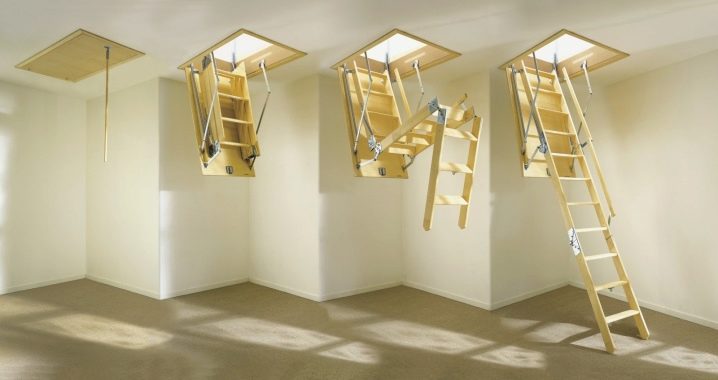
Stairwells are made of wood, natural stone, decorated with ceramic tiles. The steps should not be slippery.Today, staircase design using transparent materials and lighting is popular. For example, special tempered glass of the steps is illuminated with LEDs or wall-mounted lamps.

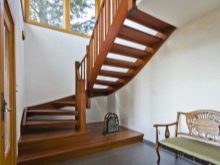
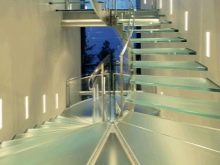
Beautiful examples
To see firsthand the possibilities of stylish design of the attic, you can refer to the examples of the photo gallery.
- Stylish attic studio in Japanese style.
- Modern roof solutions with solid glazing.
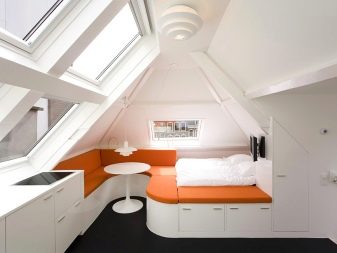
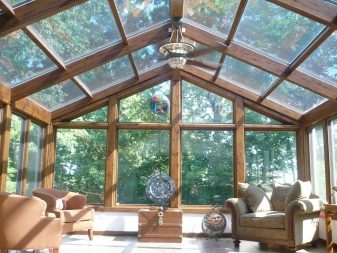
- Scandinavian style with black and white bedroom interiors.
- A small corner for reading or surfing the Internet.
- Cozy studio in the attic with a fireplace.
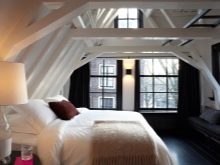
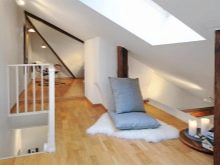
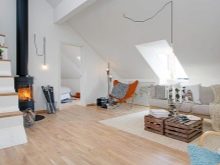
For information on how to equip an attic, see the next video.













The comment was sent successfully.